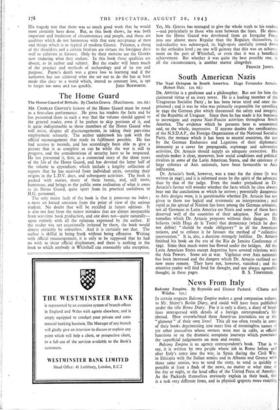South American Nazis
The Nazi Octopus in South America. Hugo Fernandez Artucio. (Robert Hale. zzs. bd.) DR. Airman is a professor and a philosopher. But not for him the cloistered virtue of an ivory tower. He is a leading member of the Uruguayan Socialist Party; has been twice tried and once im- prisoned ; and it was he wo was primarily responsible for unveiling in 1940 the German plot which threatened the safety and integrity of the Republic of Uruguay. Since then he has made it his business to investigate and expose Nazi-Fascist activities throughout South America. The evidence which he presents here is sensational and, on the whole, impressive. If anyone doubts the ramifications of the N.S.D.A.P., the Foreign Organisation of the National Socialist Party, the menace which it has been to neutral countries, the use by the German Embassies and Legations of their diplomatic immunity as a cover for propaganda, espionage and subversive activities, Dr. Artucio should supply an adequate corrective. His analysis makes it clear, moreover, how social conditions and political rivalries in some of the Latin American. States, and the existence of large colonies of Axis nationals, have been favourable to Axis infiltration.
Dr. Artucio's book, however, was a tract for the times (it was written in 1941), and it is informed more by the spirit of the advocate than by that of the judge. Even the reader prejudiced in Dr. Artucio's favour will wonder whether the facts which he cites always hear out the rnnrlusions at which he arrives - potentially dangerous as Axis designs were, it is questionable whether Dr. Armco has not given to them too logical and systematic an interpretation ; and rapid as the spread of Nazism has been among the German colonists, not all Germans in Latin America are Nazis and some of them have deserved well of the countries of their adoption. Nor are the remedies which Dr. Artucio proposes without their -dangers. He believes (with Haya de la Torre) that democracy (which he does not define) " should be made obligatory" in all the American nations, and to enforce it he favours the method of " colleCtive intervention." It is, alas, a doctrine strangely faniiliar. Dr. Artucio finished his book on the eve of the Rio de Janeiro Conference of 1942. Since then much water has flowed under the bridges. All the Latin American States except Argentina have severed relations with the Axis Powers. Some are at war. Vigilance over Axis nationals has been increased and the dangers which Dr. Artucio outlined are now more remote. They have not, however, vanished ; and the attentive reader will find food for thought, and not always agreeable


























 Previous page
Previous page